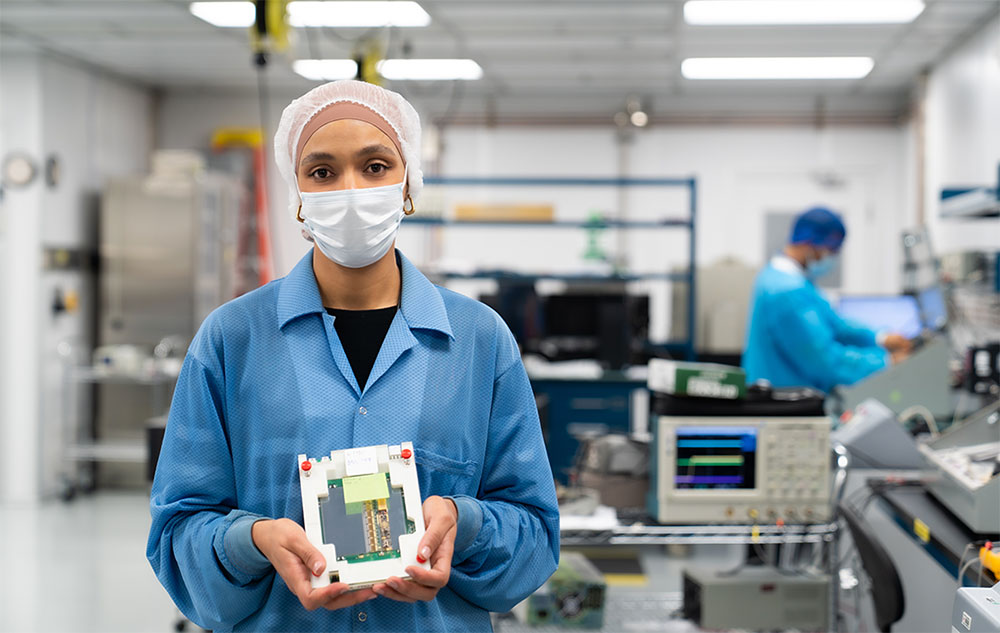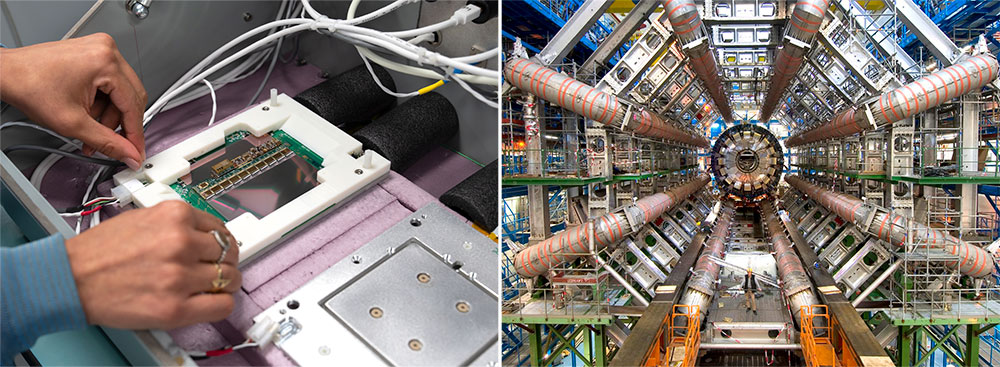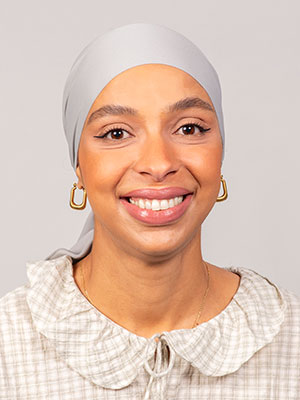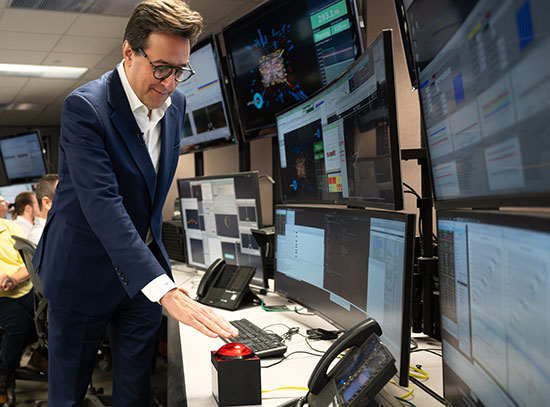Postdoc Wins Major Prize for Contributions to Physics and Outreach
Award recognizes Mounia Laassiri for leadership in particle detector technology and international outreach
September 19, 2025
 enlarge
enlarge
Mounia Laassiri, holding detector components for an upgrade to the ATLAS experiment at the Large Hadron Collider, is being recognized by UNESCO for her work on particle detector technology and international outreach. (Timothy Kuhn/Brookhaven National Laboratory)
UPTON, N.Y. — Mounia Laassiri, a postdoctoral researcher at the U.S. Department of Energy’s Brookhaven National Laboratory, has been selected as a winner of the 2025 Al Fozan Prize for her technological contributions to instrumentation and detectors for nuclear and particle physics experiments — including the ATLAS experiment, one of the major experiments analyzing high-energy particle collisions at the Large Hadron Collider (LHC) in Europe — and for her science education outreach.
The prize, established in 2023 by the United Nations Educational, Scientific and Cultural Organization (UNESCO), recognizes early career professionals in science, technology, engineering, and mathematics (STEM) fields for significant achievements or contributions to research, education, and/or international or regional cooperation in STEM. Each laureate receives a monetary award of $50,000, a medal, and a diploma.
For Laassiri, who is also a visiting scientist at the University of Johannesburg in South Africa, the citation reads: “For leadership in technology development in large international collaborations, as well as for science education on the African continent.”
“I am humbled to be selected a winner of this prestigious prize honoring young scientists in STEM,” Laassiri said. “I am grateful for all the support I have received on my academic journey. Winning this prize is a great source of encouragement to do better.”
As a member of the ATLAS collaboration, Laassiri has been working on upgrades to detector components that track thousands of particles streaming from collisions between speeding beams of protons at the LHC. Her contributions help ensure that the research at this powerful particle collider provides new insights into the fundamental particles that make up the universe.
While the LHC is located on the border of Switzerland and France and operated by CERN, the European Organization for Nuclear Research, Brookhaven Lab plays a leading role as the host laboratory for all U.S.-based members of the ATLAS collaboration. Scientists at Brookhaven have contributed to the ATLAS detector’s construction, operation, and upgrades. The Lab is also a leader in project management and data storage, distribution, and analysis for the collaboration. These contributions and the Lab’s expertise in particle detector technology make it a natural place for Laassiri to be working alongside other members of the Lab’s team on the ATLAS Phase II Tracker Upgrade.
Specifically, Laassiri is responsible for all aspects of testing components of the “strips barrel.” Beyond production of these detector elements, Laassiri’s work requires developing innovative strategies for testing and quality control. For example, she is responsible for implementing interlock systems to ensure the safe thermal cycling of silicon strip modules, enhancing operational safety and reliability. She’s also developed the technical expertise required to operate data-acquisition software and hardware. She actively troubleshoots testing problems and trains newcomers in all aspects of her work.
 enlarge
enlarge
The "strips barrel" detector elements Laassiri is producing and testing (left) will be installed in the 7,000-ton ATLAS detector (right) to track particles streaming from collisions at the center of the detector. (Timothy Kuhn/Brookhaven National Laboratory; Maximilien Brice/CERN)
Laassiri is also active in sharing what she does with future scientists around the world. She is deeply involved in the organization and management of intensive outreach efforts to expose students to research activities in fundamental and applied physics, particularly through the African School of Fundamental Physics and Applications, in which she was also a student participant in 2016. She’s helped to expand that program to include training for high school teachers, outreach to high school students, international conferences, online lectures, and short-term visits for research.
Laassiri was selected for a short-term research visit to Brookhaven to work on detector calibration for the Deep Underground Neutrino Experiment soon after completing her Ph.D. studies in Morocco in 2019. Her connections to Brookhaven Lab continued through various collaborative research roles, including while she worked in a postdoctoral position at the Helsinki Institute of Physics. In May 2024, she accepted a postdoctoral position at Brookhaven Lab with the responsibility of fundamental physics research for the development of detectors for the upgrades of the experiments at the LHC.
Laassiri also meets with early-career physicists to address issues related to their career growth and development. She is an editor of the African Physics Newsletter, published quarterly by the American Physical Society, where she was elected to the executive committee of the Forum on International Physics. She is also a member of the governing council of the Arab Physical Society, where she is contributing to strategic planning and leadership to advance physics research, education, and collaboration.
Brookhaven National Laboratory is supported by the Office of Science of the U.S. Department of Energy. The Office of Science is the single largest supporter of basic research in the physical sciences in the United States and is working to address some of the most pressing challenges of our time. For more information, visit science.energy.gov.
Follow @BrookhavenLab on social media. Find us on Instagram, LinkedIn, X, and Facebook.
2025-22589 | INT/EXT | Newsroom










